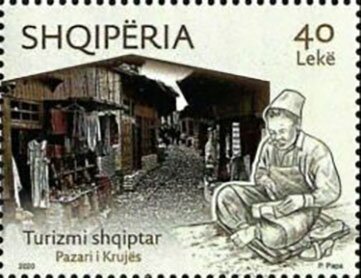Stamp: Bazaar in Krujë (Albania 2021)
Bazaar in Krujë (Albania 2021)
12 April (Albania ) within release Tourism : Bazaars (2021) goes into circulation Stamp Bazaar in Krujë face value 40 Albanian lek
| Stamp Bazaar in Krujë in catalogues | |
|---|---|
| Colnect codes: | Col: AL 2021-05b |
Stamp is square format.
stamp from se-tenant block of fourAlso in the issue Tourism : Bazaars (2021):
- Stamp - Bazaar in Korçë face value 10;
- Stamp - Bazaar in Krujë face value 40;
- Stamp - Bazaar in Shkodër face value 50;
- Stamp - Bazaar in Tirana face value 200;
- Se-tenant - Tourism : Bazaars face value 300;
|
Data entry completed
53%
|
|
|---|---|
| Stamp Bazaar in Krujë in digits | |
| Country: | Albania |
| Date: | 2021-04-12 |
| Print: | Offset lithography |
| Emission: | Commemorative |
| Format: | Stamp |
| Face Value: | 40 Albanian lek |
Stamp Bazaar in Krujë it reflects the thematic directions:
Architecture (Latin architectura, from the Greek ἀρχιτέκτων arkhitekton "architect", from ἀρχι- "chief" and τέκτων "builder") is both the process and the product of planning, designing, and constructing buildings and other physical structures. Architectural works, in the material form of buildings, are often perceived as cultural symbols and as works of art. Historical civilizations are often identified with their surviving architectural achievements.
n economics, a market is a composition of systems, institutions, procedures, social relations or infrastructures whereby parties engage in exchange. While parties may exchange goods and services by barter, most markets rely on sellers offering their goods or services (including labour power) to buyers in exchange for money. It can be said that a market is the process by which the prices of goods and services are established. Markets facilitate trade and enable the distribution and allocation of resources in a society. Markets allow any tradeable item to be evaluated and priced. A market emerges more or less spontaneously or may be constructed deliberately by human interaction in order to enable the exchange of rights (cf. ownership) of services and goods. Markets generally supplant gift economies and are often held in place through rules and customs, such as a booth fee, competitive pricing, and source of goods for sale (local produce or stock registration).
Tourism is travel for pleasure or business; also the theory and practice of touring, the business of attracting, accommodating, and entertaining tourists, and the business of operating tours. Tourism may be international, or within the traveller's country. The World Tourism Organization defines tourism more generally, in terms which go "beyond the common perception of tourism as being limited to holiday activity only", as people "traveling to and staying in places outside their usual environment for not more than one consecutive year for leisure, business and other purposes". Tourism can be domestic or international, and international tourism has both incoming and outgoing implications on a country's balance of payments. Today, tourism is a major source of income for many countries, and affects the economy of both the source and host countries, in some cases being of vital importance.



